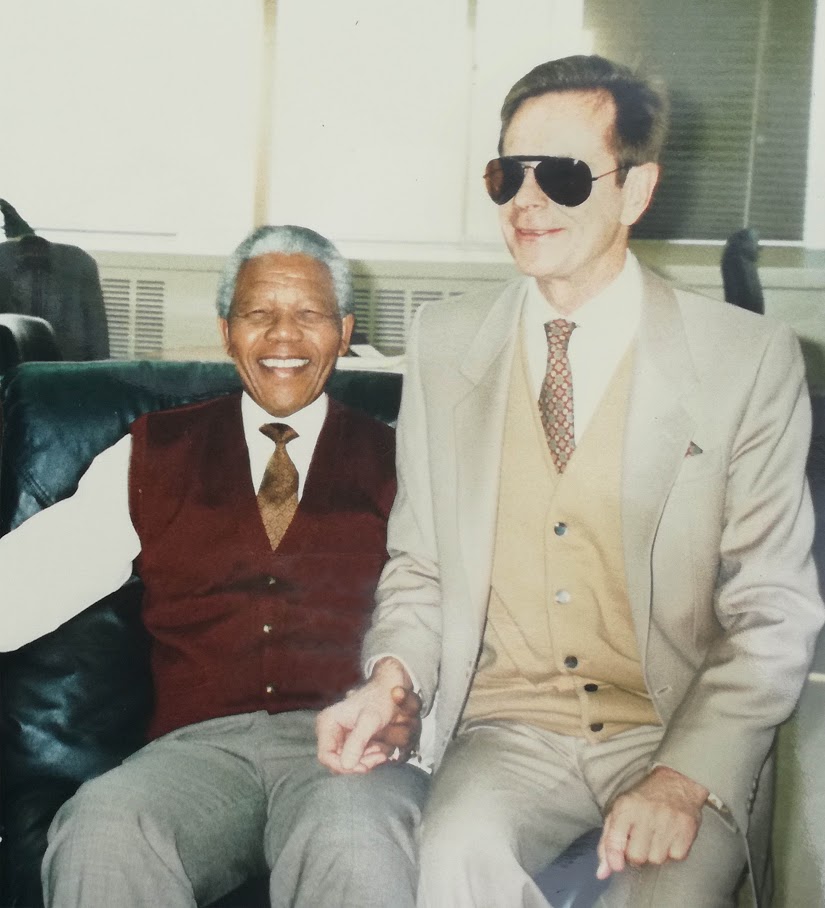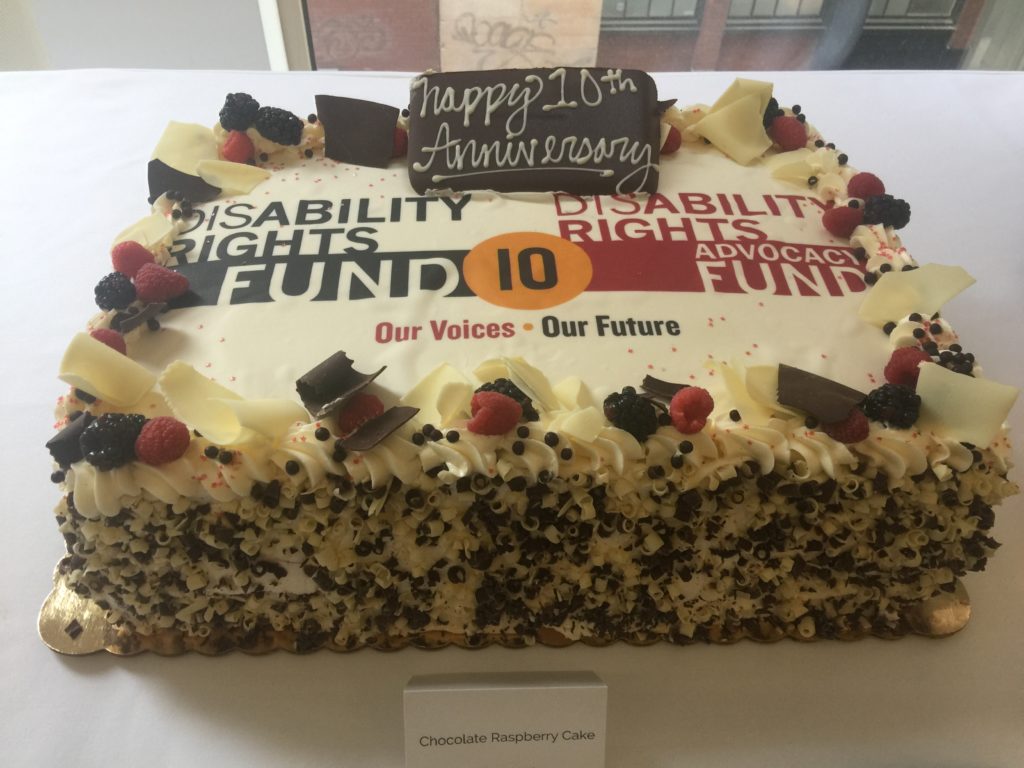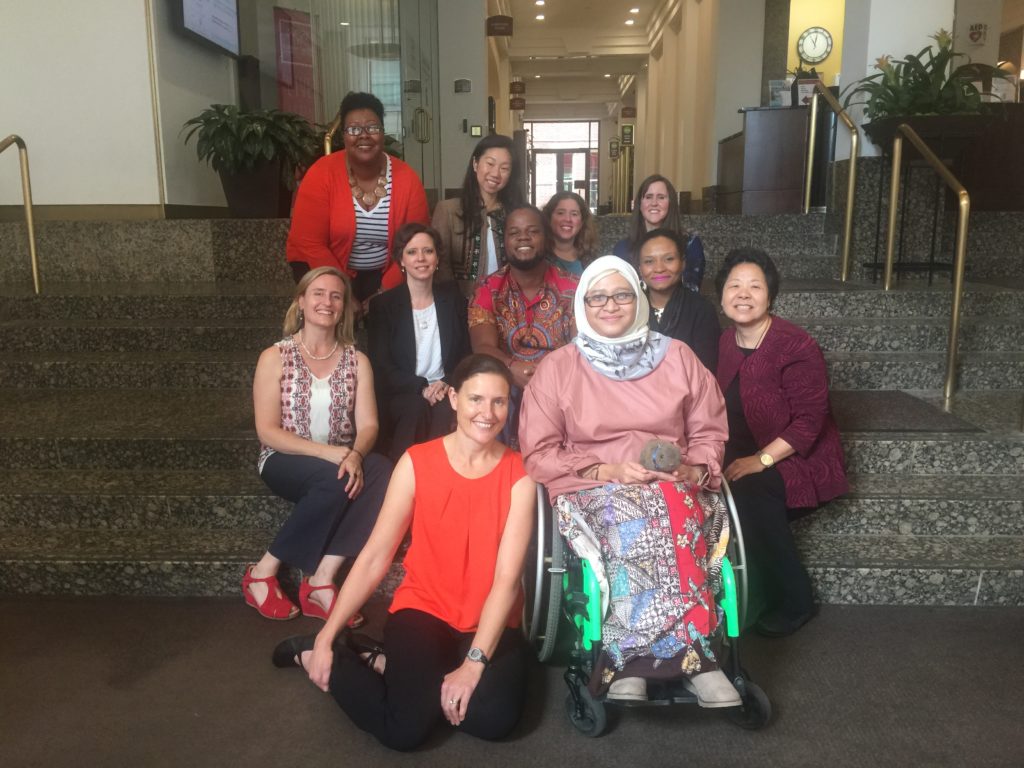Blog
DRF/DRAF - Celebrating 10 Years

William Rowland, DRF/DRAF Co-Chair, with Nelson Mandela
William Rowland, DRF/DRAF Board Co-Chair, shared his remarks at the DRF/DRAF 10th Anniversary Celebration, held in Boston. Below is William’s keynote speech reflecting on DRF/DRAF contributions to the disability rights movement.
Co-chair Catherine, co-chair Andy, founding executive director Diana, dear friends –
What a joy it is to have so many members of our team, of our movement – past and present – with us this evening to celebrate our 10th anniversary. The warmest possible welcome to you, one and all. But let me begin at a time before DRF. With the emergence of the disability rights movement in the 1980s and 1990s international donors were extremely prescriptive – not to say restrictive – in their dealings with us. They set their own narrow objectives and there was little room for negotiation.
During those years I was chairperson of the Bulawayo-based Southern Africa Federation of the Disabled (SAFOD), which included the disability activist organizations of ten countries. In our negotiations with one of the world’s biggest donors, we reached a point where we said to them: “you keep your money and we’ll keep our dignity.” The unexpected outcome of this confrontation was that they came back to us and said “can we speak again?”
All of this, this divide, began to change on the 1st of January 2008 with the launching of DRF. And DRF was unique and pioneering from the start:
- For the first time donors and disability activists sat at the same table to decide on grants to our disability comrades around the world;
- the adoption of the UN Convention on the Rights of Persons with Disabilities (CRPD) greatly strengthened our arm and gave direction to our funding; and
- we entered into partnership with the International Disability Alliance (IDA) and its member organizations to achieve our joint goals.
Ten years on: what have been our achievements?
- Over 1 000 grants totalling more than $25 million in 34 countries of Africa, Asia, Latin America, the Carribean, and the Pacific Islands;
- in addition to our grants, we have given technical assistance to numerous DPOs and engaged in joint advocacy;
- disabled people have from the start been part of our fabric as members of our staff, grantmaking committee, global advisory panel, and board of directors;
- we have displayed a gender bias in favour of women;
- we have brought in marginalized groups, such as the “little people” of Uganda and persons with intellectual disabilities in Peru, who now enjoy the right to vote in political elections; and
- we have engaged in cross-movement work, for example, with groups of indigenous persons.
And it was DRF that distilled the slogan “1 in 7” from the World Disability Report of 2008. This means that of the 7.3 billion people on the planet today 1 in 7 is disabled, a number which is greatly expanded by the impact on lives of family, friends, and community. It also means that of the 360 000 people born on Earth every day 51 000 are or will become disabled.
But our finest achievement was the role we played in the transition from the charitable or medical model to a rights-based approach. This is the approach which now predominates in disability work around the world.

DRF 10 year anniversary cake
However, ten years on and the majority of disabled people in poorer countries still live in poverty and are unemployed. Hundreds of millions of disabled children and youth are out of school, lack access to health facilities, and the availability of life-changing technology, let alone livelihoods. But there has been a major cultural change with governments, in the corporate world, at NGOs, and with the public at large: the adoption of the guiding principle nothing about us without us,
which means that the voice of disabled people must be heard in all decisions affecting their lives.
I have referred to the transition from a medical model to the rights-based approach. A further transition is currently in progress towards full inclusion, as in community-based inclusive development (CBID) and disability inclusive development (DID).
What we have witnessed in our work over the past decade has been powerful, has been irresistible, has been revolutionary, and has been – I choose my words carefully – a thing of beauty. In the Oxford English dictionary one of the meanings given to the word beauty is “an excellent example of something”. This description surely applies to DRF.
And so we are gathered here this evening to express our gratitude to our team and the DRF movement and to recognize the valuable contributions of staff and management, the grantmaking committee, the global advisory panel, the board of directors, and our sighted guides, Sign Language interpreters, and personal attendants. Indeed, this is for all of us a hard-won and well-earned celebration of remarkable achievements.
Let me end on a high note literally and figuratively. One of the greatest African jazz musicians, South African trumpeter and vocalist Hugh Masekela, passed away very recently and bequeathed to us a powerful song, Thuma Mina. I quote from his song:
I wanna be there when the people start to turn it around
When they triumph over poverty …
The list goes on and each hardship which Hugh mentions most acutely affects disabled people. I believe that you and I can truly say: We were there when disabled people in many places started to turn it around!

DRF/DRAF staff members group photo